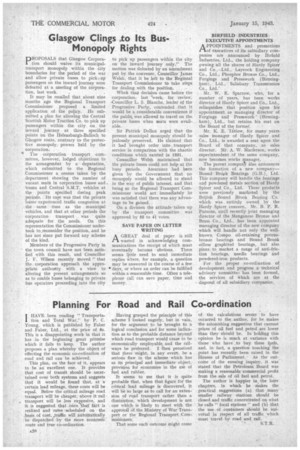Planning For Road and Rail Co-ordination
Page 22

If you've noticed an error in this article please click here to report it so we can fix it.
1 HAVE been reading " Transportation and Total War," by P. C. Young, which is published by Faber and Faber, Ltd., at the price of 6s. This is a disappointing work in that it has in the beginning great promise which it fails to keep. The author proposes a plan whereby the object of
• effecting the economic co-ordination of road and rail can be achieved.
This plan, on the face of it, appears to be an excellent one. It provides that cost of transit should be ascertained over both systems and suggests that it would be found that, at a certain lead mileage, these costs will be equal. Below the critical mileage road transport will be cheaper, above it rail' . transport will be Jess expiensive, and it is suggested that bike that fd.tt is realized and rates -scheduled on the .hasis of cost, ;traffic will antornatically be. dispatched by the more economic route and true co-ordination. Having -grasped the principle of this scheme I looked eagerly, but in vain, for the argument to be brought to a logical conclusion and for some indication as to the probable distance beyond which road transport would cease to he economically employable and the railways be preferred. I then perceived that there might, in any event, be a serious flaw in the scheme which has as its principal and immediate object, provision for economies in the uSe of fuel and rubber.
It seems to me that it is quite probable that, when that figure for the critical lead mileage is discovered, it will be so large as to call for an extension of road transport rather than a diminution, which development is not one which is likely to meet with the approVal cif the Ministry of War Transport or the Regional Transport Corn-. missioners.
That some such outcome might come of the calculations seems to have occurred, to the author, for he makes the astonishing suggestion that current prices of oil fuel and petrol are lower than they should he. In holding this opinion he is much at variance with 'those who have .to buy these ffels, and, in fact, a question touching the point has recently been raised, in the Houses of Parliament.. As the outcome of the ensuing inquiry, it was stated that the Petroleum Board was making a reasonable commercial profit from the sale of oil fuel and petrol.
The author is happier in. the later . chapters, in which he makes the practical suggestions (a) that .many smaller railway stations should be closed and traffic concentrated on what he calls "focal stations" and (b) that the use of containers should be nui • versal in respect of all -traffic which
must travel, by road and rail. .




















































